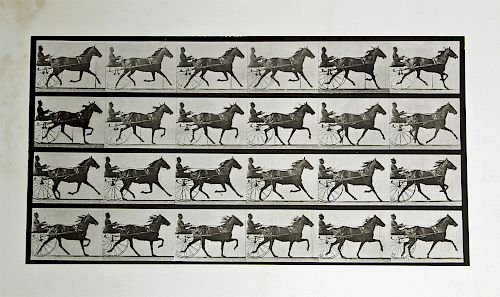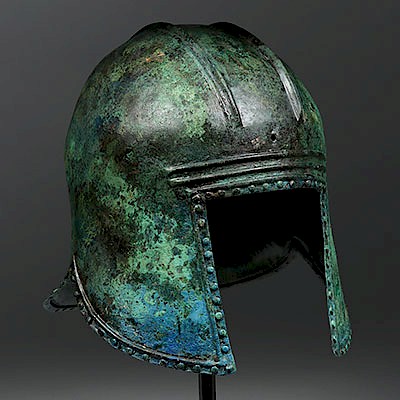Muybridge Collotype "Trotting, Sulky, Katydid" 1887
Lot 49
About Seller
Artemis Gallery
686 S Taylor Ave, Ste 106
Louisville, CO 80027
United States
Selling antiquities, ancient and ethnographic art online since 1993, Artemis Gallery specializes in Classical Antiquities (Egyptian, Greek, Roman, Near Eastern), Asian, Pre-Columbian, African / Tribal / Oceanographic art. Our extensive inventory includes pottery, stone, metal, wood, glass and textil...Read more
Categories
Estimate:
$1,400 - $2,000
Absentee vs Live bid
Two ways to bid:
- Leave a max absentee bid and the platform will bid on your behalf up to your maximum bid during the live auction.
- Bid live during the auction and your bids will be submitted real-time to the auctioneer.
Bid Increments
| Price | Bid Increment |
|---|---|
| $0 | $25 |
| $300 | $50 |
| $1,000 | $100 |
| $2,000 | $250 |
| $5,000 | $500 |
| $10,000 | $1,000 |
| $20,000 | $2,500 |
| $50,000 | $5,000 |
| $100,000 | $10,000 |
| $200,000 | $20,000 |
About Auction
By Artemis Gallery
May 10, 2018
Set Reminder
2018-05-10 10:00:00
2018-05-10 10:00:00
America/New_York
Bidsquare
Bidsquare : Fine Ethnographic / Asian / Ancient Art
https://www.bidsquare.com/auctions/artemis-gallery/fine-ethnographic-asian-ancient-art-3213
Featuring antiquities from around the world including Pre-Columbian, Tribal, Classical, Asian, so much more! Artemis Gallery info@artemisgallery.com
Featuring antiquities from around the world including Pre-Columbian, Tribal, Classical, Asian, so much more! Artemis Gallery info@artemisgallery.com
- Lot Description
Eadweard Muybridge (American born in England, 1830-1904), "Trotting, Sulky, Katydid" - plate 609 from "Animal Locomotion" series. Philadelphia: University of Pennsylvania, 1887. An endearing collotype of 24 freeze frame sequential photographs by Eadweard Muybridge, a legendary pioneer of motion photography best known for capturing animal and human movements deemed imperceptible to the human eye (see extended description below). This piece depicts the horse Katydid trotting, harnessed to sulky and driver before a row of 24 cameras placed precisely at a right angle to its path. To make these exposures, Muybridge used electromagnetic shutters that sequentially fired through a clock-driven electrical device. Size: image measures 7.5" L x 14.375" W (19 cm x 36.5 cm); 13.5" L x 19.5" W (34.3 cm x 49.5 cm) with margins; sheet measures 19" L x 24" W (48.3 cm x 61 cm)
Eadweard Muybridge is widely considered to be one of the most influential photographers in the study of motion. The English born Muybridge traveled to California around 1852. His early romantic views of the West gained him enough acclaim to be appointed the Director of Photographic Surveys for the United States government. Because the capturing of these grand western vistas required Muybridge to use huge glass collodion-treated plates, he was approached by ex-California governor Leland Stanford to photograph his beloved horse. The principal purpose was to settle a wager based on the positioning of a horse’s legs in the action of trotting, the question being whether all four hooves came off the ground at the same time. After a few unsuccessful attempts, Muybridge managed to set up a battery of cameras enabling him to record split second movements. His continuing work with animals and models in motion eventually led to his invention of the “zoopraxiscope,” a moving picture machine that showed a rapid succession of images. Throughout the 1880s, Muybridge lectured in America and abroad. With the help of Thomas Eakins, he found sponsors at the University of Pennsylvania and Muybridge continued his work there, taking thousands of locomotion studies of men, women, children, animals and birds. The results were published in a epic portfolio of 781 folio prints after his photographs entitled, "Animal Locomotion". Muybridge’s motion studies are considered to be a critical step in the evolution of photography to motion pictures.
Provenance: private Denver, Colorado, USA collection
All items legal to buy/sell under U.S. Statute covering cultural patrimony Code 2600, CHAPTER 14, and are guaranteed to be as described or your money back.
A Certificate of Authenticity will accompany all winning bids.
We ship worldwide and handle all shipping in-house for your convenience.
#129437Minor losses to upper and lower left corners of sheet, rough lower edge of sheet, and small tear to lower edge that do not interfere with image. Minor stains to margin and peripheries of sheet. Image is strong.Condition
- Shipping Info
-
All shipping is handled in-house for your convenience. Your invoice from Artemis Gallery will include shipping calculation instructions. If in doubt, please inquire BEFORE bidding for estimated shipping costs for individual items.
-
- Buyer's Premium



 EUR
EUR CAD
CAD AUD
AUD GBP
GBP MXN
MXN HKD
HKD CNY
CNY MYR
MYR SEK
SEK SGD
SGD CHF
CHF THB
THB














